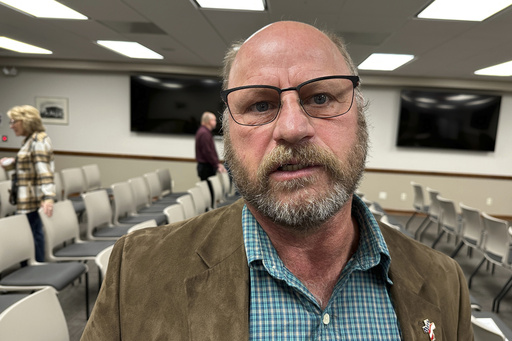BISMARCK, N.D. — On Friday, North Dakota utility regulators approved a key section of a proposed carbon dioxide pipeline that will traverse five states in the Midwest. This decision marks a significant step forward for Summit Carbon Solutions, a company facing strong opposition from landowners and various challenges in its development plans.
The North Dakota Public Service Commission unanimously granted a siting permit for a revised 333-mile route proposed by Summit Carbon Solutions. Their ambitious $8 billion project aims to transport significant quantities of CO2 emissions from 57 ethanol plants across multiple states for underground storage in North Dakota.
Despite this recent approval, construction for the project has yet to commence. Iowa has given its nod to the initiative; however, additional regulatory challenges still persist in North Dakota, South Dakota, Minnesota, and Nebraska. The recent approval comes after a tumultuous period for Summit, which saw its permit rejected in North Dakota earlier this year, followed by a similar outcome in South Dakota. Another company in this sector, Navigator CO2 Ventures, abandoned its plans during the same timeframe citing unpredictable regulatory processes.
Proponents view carbon capture initiatives as viable solutions to tackle climate change, especially with generous federal tax credits available for such projects. The ethanol sector is hopeful that the development of Summit’s pipeline will open up doors in sustainable aviation fuel markets, benefiting the corn-rich state of Iowa.
Governor Doug Burgum of North Dakota, a contender for President-elect Donald Trump’s Interior Secretary post, emphasizes the state’s geological capacity for CO2 storage, referring to it as a “geologic jackpot.”
Conversely, many landowners and residents express significant concerns regarding the potential risks associated with the pipeline, including fears about the catastrophic effects of a CO2 leak impacting public health. Additional apprehensions revolve around the prospect of land being seized through eminent domain, and Commission Chairman Randy Christmann has advised the company to minimize the use of such power.
In response to the panel’s favorable ruling, Summit CEO Lee Blank expressed satisfaction and reiterated that the company will work collaboratively with landowners, focusing on securing land rights voluntarily. To date, Summit claims to have acquired easements for over 82% of its proposed North Dakota route.
State Senator Jeff Magrum, who opposes the pipeline in his district, argues that public funds would be better allocated toward infrastructure like roads and bridges rather than what he describes as ineffective “Green New Deal projects.” He anticipates challenges to the recent decision.
Skeptics of carbon capture technology argue that it remains largely unproven on a large scale and may merely sustain fossil fuel industries. Nonetheless, progress has been made in Iowa, where the Utilities Commission granted Summit a hazardous liquid pipeline permit and related eminent domain rights for several parcels of land.
Summit’s construction timeline in Iowa remains contingent on receiving necessary approvals from both North Dakota and South Dakota, alongside permissions for underground storage facilities. The panel in Iowa has faced lawsuits from opponents of the project.
After previously denying Summit’s siting permit based on unresolved issues, the North Dakota Commission agreed to revisit the application, leading to a year-long process of discussions and document reviews.
In a partnership formed in 2022, Minnkota Power Cooperative agreed to assist Summit in developing CO2 storage options in central North Dakota. This agreement allows Summit access to Minnkota’s already approved underground storage.
Recently, South Dakota’s Public Utilities Commission rejected Summit’s permit application due to route violations against county regulations. Summit plans to reapply shortly. In a separate vote, South Dakota residents also rejected a set of regulations that critics warned would diminish local governance over such projects.
In Minnesota, regulators are expected to reach a decision on December 12 regarding a 28-mile pipeline segment linking to an ethanol facility near Fergus Falls. An administrative judge has already suggested that the environmental review for this segment meets legal standards.
Critics have raised concerns about potential impacts on agriculture and water resources, advocating for broader considerations of the extensive Midwest Carbon Express pipeline. In Nebraska, where there is no formal state process for CO2 pipelines, Summit is navigating individual county regulations, though at least one county has denied its permit application.
